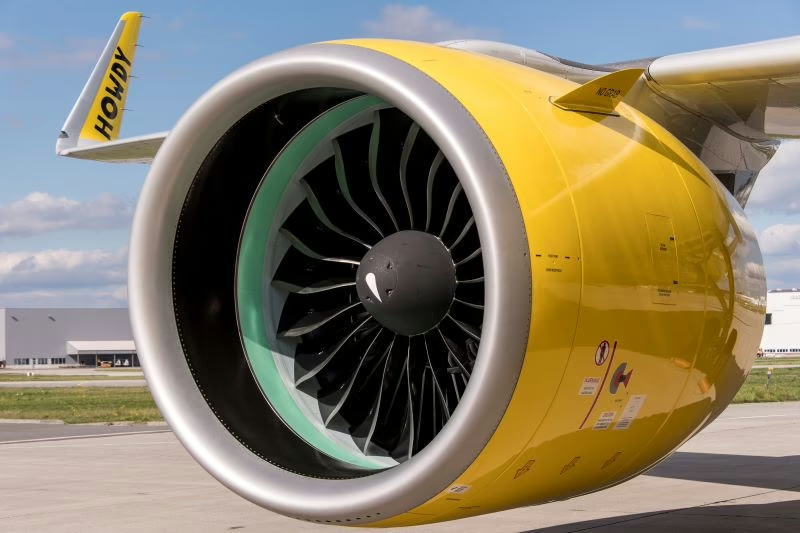FAA Mandates Pratt & Whitney PW1100G Checks, Reveals Potential New Issue

A December 2022 engine shutdown on a PW1100G-powered Airbus A320neo led Pratt & Whitney to determine that unscheduled inspections are needed to detect cracks in a potentially flawed batch of turbine disks, an FAA rule mandating the checks reveals.
The previously undisclosed incident was traced to a high pressure compressor seventh-stage integrated blade rotor (IBR-7) failure, the FAA airworthiness directive (AD) said. While different than the high-pressure turbine (HPT) stage 1 and stage 2 disks affected by the AD and being pulled from service for expedited checks, the underlying methodology for analyzing failure risks are the same. Pratt reviewed parts records “and re-evaluated their engineering analysis methodology,” the FAA said. “The new analysis identified HPT 1st-stage hubs and HPT 2nd-stage hubs that are susceptible to failure much earlier than previously determined.”
Pratt parent RTX, formerly Raytheon Technologies, on July 25 revealed what Pratt determined: About 200 engines need inspections by the end of September and perhaps 1,000 more will need checks by September 2024. The previous recommendation, mandated by FAA, said inspections of the affected disk population during scheduled shop visits—done every 7-10 years depending on utilization patterns—would suffice.
The FAA’s AD, which bypassed the draft-and-comment stage because of the issue’s severity, mandates Pratt’s recommended inspections on the most susceptible engines within 30 days of its effective date. The rule is slated to be published Aug. 22, but this could change. It goes into effect five days later, putting the initial inspection deadline on or around Sept. 26.
Pratt informed operators of its findings and updated recommendations Aug. 4. The FAA directive is based on Pratt’s update.
The AD does not change the affected population of about 2,070 disks first identified in July 2022, when Pratt recommended the shop-visit inspections. The inspection method, an ultrasonic inspection, also remains the same.
One change is the addition of some PW1400-series engines built for Russian-made Irkut MC-21s. Ukraine-related war sanctions have forced Irkut to drop the Pratt engine for the still-in-development program, however. The PW1100G and PW1400G differ only in thrust ratings.
Affected engines have at least one of parts flagged by Pratt as containing contaminated powder metal (PM) that can contribute to cracking. The PM-contaminated parts were produced by Pratt from late 2015 through early 2021, the company said.
The issue came to light during the probe of a March 2020 engine failure on a Vietnam Airlines Airbus A320ceo. In that case, a contaminated IAE V2500 HPT stage 1 disk failed.
Pratt’s initial analysis flagged a small batch of V2500 parts with contaminated PM. It later broadened its root-cause analysis to look at parts on other engines with similar material. That turned up more affected parts, including some on current-generation PW1000G-family engines. The findings prompted regulatory mandates, including one on the current population of disks that came out in 2022.
The new FAA directive affects 10 engines on U.S.-registered aircraft. U.S. carriers Hawaiian Airlines, JetBlue Airways and Spirit Airlines have said their fleets will be affected by the checks. An Aviation Week analysis of delivery dates that coincide with when the faulty parts were made suggests most of the 1,200 aircraft flagged for near-term inspections are with non-U.S. carriers, with IndiGo (135 aircraft), Air China (46), Go First (45) and Volaris (44) topping the list.
The directive does not identify the operator involved in the Dec. 24, 2022 engine failure. Mexican aviation authorities are investigating an engine failure involving a Pratt-powered VivaAerobus Airbus A320neo on that date, but few details have been released. The probe is ongoing.
Still unclear are ramifications on Airbus A220s and Embraer E2s powered by other PW1000G-family variants with less commonality to the PW1100G. RTX President Chris Calio said in July that while those fleets are likely to be affected, “the current expectation is that they will be less impacted based upon existing inspections, utilization profiles and maintenance intervals.”
Also unclear: the scope and potential ramifications of the IBR-7 failure flagged by the FAA and not previously disclosed by Pratt. The FAA directive provides no other information on the incident or follow-up actions.
